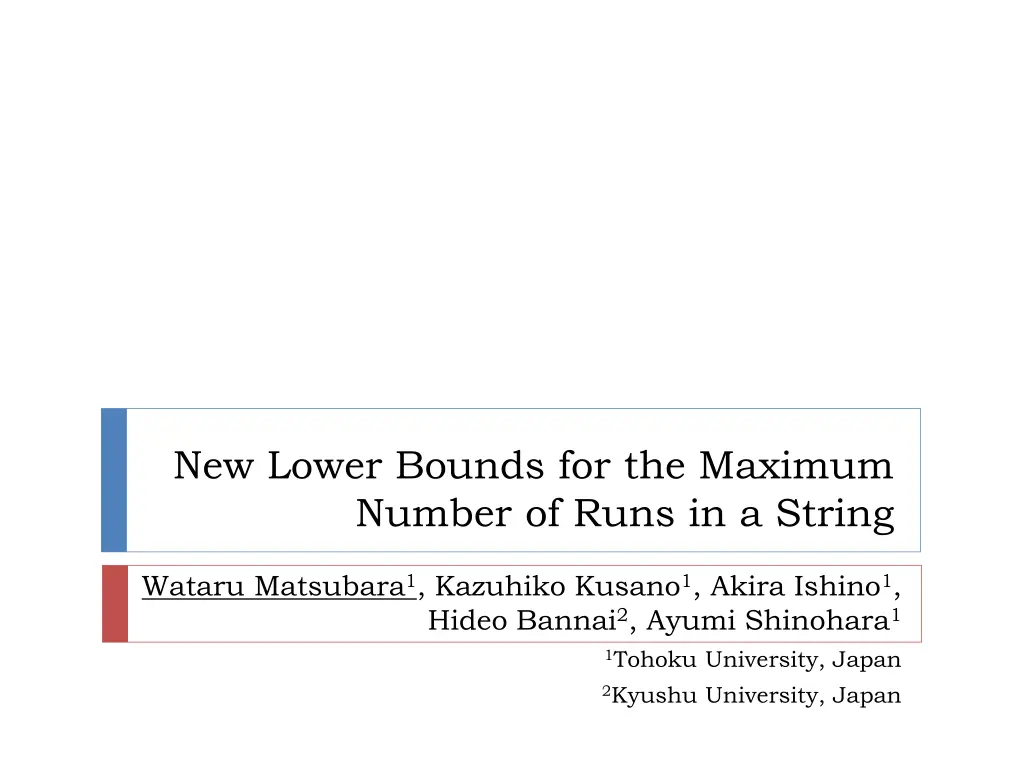
New Lower Bounds for Maximum Runs in a String
"Explore the latest research on maximum runs in strings, with detailed insights on lower bounds, heuristics, and asymptotic analysis. Discover the ground-breaking new lower bound results on run-rich strings in this informative study."
Download Presentation

Please find below an Image/Link to download the presentation.
The content on the website is provided AS IS for your information and personal use only. It may not be sold, licensed, or shared on other websites without obtaining consent from the author. If you encounter any issues during the download, it is possible that the publisher has removed the file from their server.
You are allowed to download the files provided on this website for personal or commercial use, subject to the condition that they are used lawfully. All files are the property of their respective owners.
The content on the website is provided AS IS for your information and personal use only. It may not be sold, licensed, or shared on other websites without obtaining consent from the author.
E N D
Presentation Transcript
New Lower Bounds for the Maximum Number of Runs in a String Wataru Matsubara1, Kazuhiko Kusano1, Akira Ishino1, Hideo Bannai2, Ayumi Shinohara1 1Tohoku University, Japan 2Kyushu University, Japan
Contents Introduction New lower bounds A brief history of results on bounds Simple heuristics for generating run-rich strings Analyzing asymptotic lower bounds Discussion Conclusion and further research 2 Prague Stringology Conference 2008 / 23
runs runs: occurrence of a periodic factor non-extendable (maximal) exponent at least two primitive-rooted 8 3 aabaabaa=(aab) period :3 root :aab 8 example: exponent: 3 aabaabaaaacaacac 3 Prague Stringology Conference 2008 / 23
number of runs: (n) run(w) number of runs in string w (n) = max{run(w) : |w| = n } maximum number of runs in a string of length n For any string w, run n ) ( ( ) w | n | w example run(aabaabbaabaa)=8 n (n) 1 0 2 1 3 1 4 2 5 2 6 3 7 4 8 5 9 5 10 6 11 7 12 8 4 Prague Stringology Conference 2008 / 23
Max Number of Runs cn [Kolpakov & Kucherov 99] c in a String c 5n 5n [Rytter 06] 1.048n [Crochemore et al. 08] 1.05n 4n 3.48n [Puglisi et al. 08] 3.44n [Rytter 07] 1.00n 3n 0.95n 0.927n [Franek et al. 03] [Franek & Yang 06] 1.6n [Crochemore & Ilie 08] 2n 0.90n n 5 / 23 0
Our result: New lower bound We discovered a run-rich string = aababaababbabaababaababbabaababaabbaababaababbabaababaababbabaababaabbabaababaababbabaababaababbaba ababaabbaababaababbabaababaababbabaababaabbabaababaababbabaababaabbabaababbabaababaababbabaababaabb abaababaababbabaababaababbabaababaabbabaababbabaababaababbabaababaabbabaababaababbabaababaabbabaaba bbabaababaababbabaababaabbabaababaababbabaababaababbabaababaabbabaababaababbabaababaabbabaababbabaa babaababbabaababaabbabaababaababbabaababaababbabaababaabbabaababbabaababaababbabaababaabbabaababaab abbabaababaabbabaababbabaababaababbabaababaabbabaababaababbabaababaababbabaababaabbabaababaababbaba ababaabbabaababbabaababaababbabaababaabbabaababaababbabaababaabbabaababbabaababaababbabaababaabbaba ababaababbabaababaababbabaababaabbabaababbabaababaababbabaababaabbabaababaababbabaababaabbabaababba baababaababbabaababaabbabaababaababbabaababaababbabaababaabbabaababaababbabaababaabbabaababbabaabab aababbabaababaabbabaababaababbabaababaababbabaababaabbabaababbabaababaababbabaababaabbabaababaababb abaababaabbabaababbabaababaababbabaababaabbabaababaababbabaababaababbabaababaabbabaababaababbabaaba baabbabaababbabaababaababbabaababaabbabaababaababbabaababaabbabaababbabaababaababbabaababaabbabaaba baababbabaababaababbabaababaabbabaababbabaababaababbabaababaabbabaababaababbabaababaabbabaababbabaa babaababbabaababaabbabaababaababbabaababaababbabaababaabbabaababaababbabaababaabbabaababbabaababaab abbabaababaabbabaababaababbabaababaababbabaababaabbabaababbabaababaababbabaababaabbabaababaababbaba ababaabbabaababbabaababaababbabaababaabbabaababaababbabaababaababbabaabab run( ) = 1455, | | = 1558 Known best lower bound 3 1455 ( ) 0.927 n n n ( ) 0.933 n n n + 1 5 1558 [Franek et al. 03] New lower bound 6 Prague Stringology Conference 2008 / 23
How to generate run-rich string run( ) = 1455, | |= 1558 ( ) 1455 run = = 0.9338.. | | 1558 Let = [1:1557] (delete the last character), the number of runs not decrease drastically. run( ) = 1453, | |= 1557 1453 | ' | ( ) ' run = = 0.9332.. 1557 In order to generate run-rich string, We only have to do is to append single character to run-rich string. 7 Prague Stringology Conference 2008 / 23
The search first starts with the single string a in the buffer. At each round, two new strings are created from each string in the buffer by appending a or b to the string. The new strings are then sorted with respect to the number of runs. Only those that fit in the buffer size are retained for the next round. buffer size:10 aaaaa 1 aaaab 1 aaaba 1 aaabb 2 aabaa 2 aabab 2 aabba 2 aabbb 2 abaaa 1 abaab 1 ababa 1 ababb 2 abbaa 2 abbab 1 abbba 1 abbbb 1 aaaa aaab aaba aabb abaa abab abba abbb aaa aaabb 2 aabaa 2 aabab 2 aabba 2 aabbb 2 ababb 2 abbaa 2 aaaaa 1 aaaab 1 aaaba 1 aa Select Top10 aab a aba ab abb 8 Prague Stringology Conference 2008 / 23
aabaaba aabaabb aababba aababbb aabbaaa aabbaab aaabbaa aaabbab aaabbba aaabbbb aabaaaa aabaaab aababaa aababab aabbaba aabbabb aabbbaa aabbbab aabbbba aabbbbb aaabba aaabbb aabaaa aabaab aababa aababb aabbaa aabbab aabbba aabbbb ababba ababbb abbaaa abbaab aaaaaa aaaaab aaaaba aaaabb aaabaa aaabab aabaab 3 aababb 3 aabbaa 3 aaabba 2 aaabbb 2 aabaaa 2 aababa 2 aabbab 2 aabbba 2 aabbbb 2 The string in the buffer become run-rich. aabaabb 4 aabbabb 4 aabaaba 3 aababba 3 aababbb 3 aabbaaa 3 aabbaab 3 aaabbaa 3 aababaa 3 aabbaba 3 aaabb 2 aabaa 2 aabab 2 aabba 2 aabbb 2 ababb 2 abbaa 2 aaaaa 1 aaaab 1 aaaba 1 Select Top10 Select Top10 9 Prague Stringology Conference 2008 / 23
Improving lower bound of (n) (1/2) We discovered a run-rich string such that run( ) = 1455, | |= 1558 1455 ) ( 0.933 n n n 1558 run( 2) > 2run( ) run( 2) = 2915, | 2|= 2 1558 = 3116 2915 ( ) 0.935 n n n 3116 10 Prague Stringology Conference 2008 / 23
Improving lower bound of (n) (2/2) Using run-rich string , can we push lower bounds higher up more? k run( k) 1 1455 2 2915 3 4374 4 5833 5 7292 6 8751 7 10210 8 11669 : | k| ( (n) ) run( k)/| k| 1558 3116 4674 6232 7790 9348 10906 12464 0.933889 0.935494 0.935815 0.935976 0.936072 0.936136 0.936182 0.936216 : Next, we give a formula that calculate number of runs in wk. 11 Prague Stringology Conference 2008 / 23
Number of runs in wk Theorem Let w be a string of length n. For any k 2, where A = run(w3) - run(w2) and B = 2run(w3) - 3run(w2) run(wk) = Ak - B 12 Prague Stringology Conference 2008 / 23
Proof of the theorem (1/4) If two strings wkand w are concatenated, the number of runs in wk+1is changed in two cases: case (a): increase A new run may be newly created at the border between two strings. abba abba abbaabba 13 Prague Stringology Conference 2008 / 23
Proof of the theorem (2/4) If two strings wkand w are concatenated, the number of runs in wk+1is changed in two cases: case (b):decrease A suffix run in wkand a prefix run in w may be merged into one run in wk+1. aabaaaabaa aabaaaabaa aabaaaabaaaabaaaabaa 14 Prague Stringology Conference 2008 / 23
Proof of the theorem (3/4) By periodicity lemma, there is no runs in wksuch that length is longer than 2|w| except the whole string wk. For any k 3, run(wk) - run(wk-1) = c (constant). w w w w w 15 Prague Stringology Conference 2008 / 23
Proof of the theorem (4/4) Theorem Let w be a string of length n. For any k 2, run(wk) = Ak - B where A = run(w3) - run(w2) and B = 2run(w3) - 3run(w2) proof For any k 3, run(wk) - run(wk-1) is a constant. 16 Prague Stringology Conference 2008 / 23
Asymptotic behavior of (n) Theorem For any string w and any >0, there exists a positive integer N such that for any n N, n w 3 2 ( ) ( ) ( ) n run w run w | | proof A B N = k ( ) run w Ak B ) 1 + ( ( ) n n 17 Prague Stringology Conference 2008 / 23
Discovered run-rich strings See our web site [http://www.shino.ecei.tohoku.ac.jp/runs] r( ) r( 2) r( 3) (n) Length of 125 1558 60064 105405 184973 110 1455 56714 99541 174697 227 2915 343 0.928 4374 0.93645 170181 0.944542 298664 0.944557 524136 0.944565 113448 199103 349417 We found some run-rich strings by using heuristic search. current best lower bound The strings in the buffer are sorted with respect to r(w3)-r(w2), instead of r(w) for improving asymptotic behavior. 18 Prague Stringology Conference 2008 / 23
Discussion What is the class of run-rich strings? Sturmian words are not run-rich. [Rytter2008] (for any Sturmian word w) 8 . 0 | | w ( ) run w Any recursive construction of a sequence of run-rich strings? We believe that compression has a clue to understanding. run-rich string (| |=184973) can be represented by only 24 LZ factors. 19 Prague Stringology Conference 2008 / 23
LZ-factorization of ( | | = 184973 ) = aababaababbabaababaababbabaababab (0,1) (1,3) (1,4) (2,8) (5,13) : a, (0,1) / b / (1, 3) / (1, 4) / (2, 8) / (5, 13) (12,19) / (26,31) / (49,38) / (50,63) / (89,93) / (113,162) / (57,317) / (249,693) / (275,984) / (879,2120) / (942,3041) / (2811,6521) / (2999,9374) / (8764,20072) / (9332,28878) / (27096,45341) / (38210,67195) LZ( )= 20 Prague Stringology Conference 2008 / 23
Conclusion We Introduced new approach for analyzing lower bounds using heuristic search. We Improved the lower bound of the number of runs in a string. new lower bound is 0.944565. 21 Prague Stringology Conference 2008 / 23
Further research Improving heuristic algorithm Speed up for counting runs in strings Find good heuristics Guess run-rich strings in compressed form (LZ factors) Analyzing the class of run-rich strings Any recursive construction of a sequence of run-rich strings? Relation with compression Algorithms for finding all runs in strings process compressed string without decompression. 22 Prague Stringology Conference 2008 / 23
Max Number of Runs cn [Kolpakov & Kucherov 99] c in a String c 5n 5n [Rytter 06] 1.048n [Crochemore et al. 08] 1.05n 4n 3.48n [Puglisi et al. 08] 3.44n [Rytter 07] 1.00n 3n 0.944565n [Matsubara et al. 08] 0.95n 1.6n [Crochemore & Ilie 08] 2n 0.927n [Franek et al. 03] 0.90n n thank you for your attention. 23 / 23 0
Appendix 24 Prague Stringology Conference 2008 / 23
Conjecture: (n) < n 60 50 40 30 n (n) 20 10 0 0 10 20 30 40 50 60 25 Prague Stringology Conference 2008 / 23






















